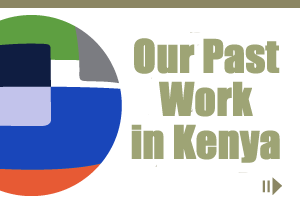Nairobi, August 18, 2011 – Refugees in Dadaab camps are suffering from a large - scale information gap that is almost inevitably putting lives at risk. There is every indication that the information gap is hampering the aid response, and that current communication strategies are not working effectively.
These are the early indications from an information and communications needs assessment conducted by Internews, together with Star FM, Radio Ergo, International Media Support (IMS) and the Norwegian Refugee Council (NRC) from August 07-14 in the Dadaab camps. The assessment was conducted to help understand the information needs of refugees in Dadaab, and explore ways to improve the flow of communications between refugees, aid agencies, and host communities.
An assessment report with the results of the survey, and recommendations for action will be released next week. The assessment, which was conducted by NRC staff trained on using smart phones for data collection, was conducted with more than 500 people in all four camps. Preliminary findings from over 450 interviews show that:
• The vast majority of the refugees interviewed does not have the information they need to make daily decisions and considered access to information as "very important" to their lives in the camps.
• The majority of people in the camps need "much more information" and most others stated that "have some but need more" on the services provided in the camps such as access to food, water or registration.
• Radio, friends and family, and mobile phone are, in this order, the main and most trusted sources of information. Aid workers, government officials, police and army are not trusted sources.
• Majority of respondents said that they have not been able to communicate with aid providers or the government.
• Phone calls rated highest for preferred means to give feedback, with religious leaders next followed by SMS, and call-in to radio or TV.
• People in the camps want mostly to ask questions and share concerns about their current situation.
• Mobile phone access is very high, radio access is considerable and TV access is significant.
• Asked about their intentions, the vast majority said that they want to stay in the camps until they can return to their country.
• Respondents affirmed that in times of crisis, radio is a critical source of information and as a result of information heard on the radio, people are able to make decisions to protect their health and that of their families.
For the first time on this type of assessment, Internews has used smart phones with software (episurveyor) that allows immediate data collection; making it easier and faster to gather, analyze and share data and actionable reports. By improving and supporting faster and more effective needs assessments, aid delivery can be more targeted and effective.
Historically, needs assessments haven’t looked into the information needs of affected communities. Internews is now working with the IASC Needs Assessment Task Force (NATF) in Geneva to make sure that questions on access to information are an integral part of needs assessments.
In Dadaab, Internews and Radio ERGO/IMS want to set up a local radio station with Star FM to address the information needs of refugee communities.
About Internews
Internews is an international media development organization that also works on emergencies setting up humanitarian information systems with local media to provide life-saving information and connect affected communities and aid providers. To learn more about the humanitarian media work that Internews does around the world click here.
About Radio Ergo and IMS
Since July 1 2011, IRIN radio for Somalia is Radio ERGO. International Media Support (IMS), a media development organization, supports Radio ERGO through its daughter company IMS Productions ApS with a branch office in Kenya. Radio ERGO produces one-hour daily broadcasts that are heard across Somalia and the region, including the Kenyan refugee camps, on shortwave through Star FM. These programs are also rebroadcast by seven local FM stations. ERGO also runs a 15-minute daily round-up at the top of each program of reporting from the ground on the famine and related issues, including conditions in the IDP camps across the country, and from the villages and towns hardest hit by the drought and famine. Until Radio ERGO’s website is up and running, IRIN will continue to host the programs online.



